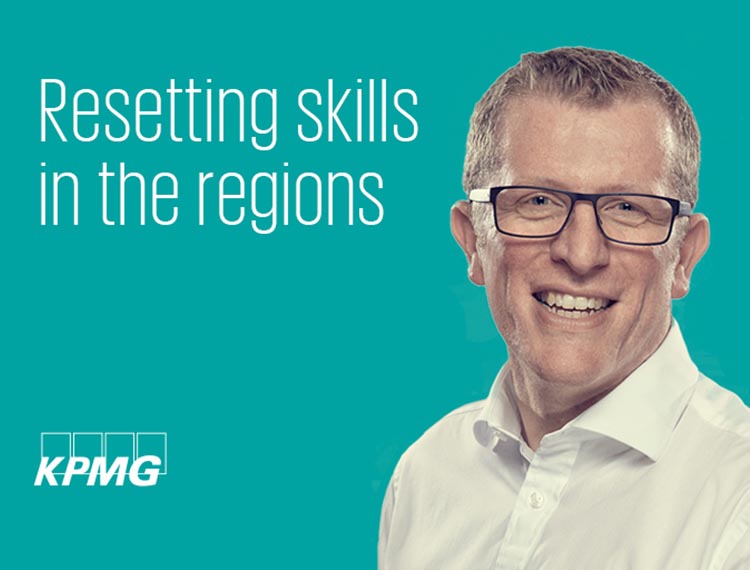KPMG launches programme of university partnerships with University of Leeds & University of Nottingham – delivering innovation incubator & insights

#LevellingUp – @KPMG, @UniversityLeeds and @UniofNottingham collaborate to link academic insights with business opportunities to support regional economies
Business advisory firm KPMG launches the first in a number of strategic partnerships to drive insight for clients and support the regional economic growth agenda. The first relationships are with the University of Leeds and the University of Nottingham.
Each collaboration has a different specialism that utilises the strengths of the university and delivers a number of initiatives, including deep and commercially useful insights to businesses, amplifying growth, innovation and productivity in regional economies. They will also explore joint initiatives regarding sectorial industry insights, skill building, learning opportunities and the sharing of collaboration space.
These university partnerships put KPMG’s commitment to collaboration in its regional markets at the heart of its plans for the future of work.
KPMG plans to launch further partnerships across the UK, which will be developed with a specific market, sector or issue focus, where KPMG and universities can together deliver insights that help businesses across the UK to achieve their ambitions.
The University of Leeds partnership will initially focus on entrepreneurship and the scale-up of high growth businesses, through the university’s innovation hub, Nexus. Nexus is a community of high growth start-ups and entrepreneurs. Its members have access to individualised business support, opportunities and connections, enabling them to innovate and deliver real commercial impact quickly.
KPMG and Nexus will collaborate on a number of new initiatives that will support business growth and deliver impact across the regional economy, for example, the creation of a joint incubation space for entrepreneurial businesses that could particularly benefit from the combined knowledge and expertise of the two organisations. The partnership will extend to the wider university to produce joint research projects and explore learning and skills development opportunities for students, businesses and KPMG colleagues.
The University of Nottingham partnership will focus on advanced data analytics. Specialists from the University’s Data-Driven Discovery Initiative (3Di) and KPMG will develop new research and provide insight that will enhance data and analytics services for businesses. The partnership will also hold events to support the innovative ideas of small and medium sized enterprises in the East Midlands Region and provide data skills training to help close the digital skills gap.
The collaboration between KPMG and the University of Nottingham forms part of the university’s new programme, Digital Nottingham, which has ambitions to transform its home city of Nottingham through data science, technology and innovation.
The partnerships will further strengthen KPMG’s place-based approach to community engagement, with the firm aiming to deliver 30% of its skills-based volunteering in government-identified social mobility coldspots by 2022. The collaborations will provide mutual benefit by enhancing KPMG’s award-winning community programme, working alongside universities to deliver further social value across their regions.
Chris Hearld, Head of Regions at KPMG, said:
“These first university partnerships are exciting examples of collaboration in UK cities to bring new value to business in our recovering economy. We will be accessing talent and expertise to support growth in the regional economies and communities in which we work across the country.
“Our heritage lies in the UK’s regional markets and our position within them remains one of our greatest strengths. We know the immense value of universities as critical drivers of the talent and innovation on which businesses depend in our cities and regions. Strengthening the bond between these parts of our economies has long been on the agenda of those focused on regional prosperity.
“The opportunity to deliver on this with institutions of the calibre of the Universities of Leeds and Nottingham is exceptional and focusing on delivering thought leadership in the fields of entrepreneurialism and data analytics will help businesses address some of their most significant opportunities.”
Dr Martin Stow, Nexus Director, said:
“We are extremely excited about this next stage of our relationship with KPMG and what it can offer to the University of Leeds, the businesses within the Nexus community and across the wider innovation ecosystem. KPMG has been a key Nexus collaborator from the beginning and offered invaluable advice and support to our members that has delivered positive commercial outcomes.
“The University of Leeds and Nexus have a shared ambition with KPMG to support regional economic growth and an innovation-driven network that inspires entrepreneurs to solve the biggest challenges facing our society today.”
Dr John Gathergood, Professor of Economics and Associate Pro-Vice Chancellor for Research and Knowledge Exchange in the Faculty of Social Sciences at the University of Nottingham, said:
“This partnership is an exciting step in our drive to boost our research offering in the area of financial services and financial technology. Digital Nottingham is our endeavour to transform our city; its potential; the skills and ambitions of our community; and deliver growth and recovery.
“Through Digital Nottingham, the university will create new partnerships with business and the community that propel forward new opportunities for growth, development and regeneration, delivering high-skilled employment, quality jobs and a new growth narrative for our region. These powerful partnerships will help us accelerate our plans to be a home to an open community of innovation and discovery, creating a place with purpose in partnership with the city council, business and local community.”











Responses